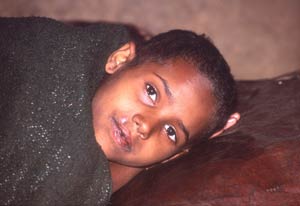Research in viral diseases aims at ending malaria
January/February 2011 | Volume 10, Issue 1
What can the role of research in the eradication of three viral diseases - smallpox, polio and measles - tell us about efforts to eradicate malaria? Quite a lot, according to a new paper published by the Public Library of Science. By examining the research undertaken in the eradication or regional elimination of these viral diseases, cross-cutting lessons were derived that apply to efforts to eradicate malaria.

Photo Courtesy of WHO/P.Virot
A young malaria patient in Ethiopia.
The authors, among them Fogarty’s Dr. Joel G. Breman, stressed the importance of starting laboratory, clinical and field research early in the program and in parallel with eradication efforts. Vaccines will likely be the linchpin interventions, but ongoing research is needed to improve formulations, delivery and immunization schedules. Surveillance will also be critical throughout, coupled with improved diagnostic methods to detect asymptomatic infections and low rates of transmission.
Implementation science principles are being applied. Malaria eradication proponents should understand the importance of combining operational and research issues. In successful elimination initiatives, the best researchers will see their ideas implemented and the best implementers will continue to ask what research could further improve operations.
Because these eradication efforts can be impeded by socio-cultural, religious and local politics, efforts should be made to improve ways to communicate effectively with local populations about the disease and the interventions to eradicate it. Finally, experience with all the viral disease programs has shown that interrupting the last vestiges of transmission is particularly problematic and requires allocation of many resources including support for focused final stages research activities.
Related to this, the WHO World Malaria Report revealed that increased financing over the past decade - despite a dropoff last year - has resulted in significant progress in improving access to insecticide-treated mosquito nets in the past three years. By the end of 2010, approximately 289 million such nets have been delivered to sub-Saharan Africa, enough to cover 76 percent of the 765 million persons at risk of malaria.
But the efficacy of these nets is exhausted over three years and replacing them poses an enormous challenge. Problems are also posed by the potential that mosquitoes became resistant to the most commonly used insecticides, the pyrethroids, and the need to differentiate malaria from non-malarial fevers prior to treatment. WHO now recommends that all cases of suspected malaria be confirmed with a diagnostic test prior to treatment.
A total of 11 countries and one area in the WHO African Region showed a reduction of more than 50 percent in either confirmed malaria cases or malaria admissions and deaths in recent years. It’s estimated that the number of malaria cases of malaria rose to 244 million in 2005 but decreased to 225 million in 2009. The number of deaths due to malaria is estimated to have decreased from 985,000 in 2000 to 781,000 in 2009.
While progress in reducing the malaria burden has been remarkable, the report said, there was evidence of an increase in 2009 in malaria cases in three countries: Rwanda, Sao Tome and Principe, and Zambia. Since many countries in sub-Saharan Africa had inadequate data to monitor disease trends, greater efforts need to be made to strengthen routine surveillance systems. Major epidemiological events could be occurring in additional countries without being detected and investigated.
The Role of Research in Viral Disease Eradication and Elimination Programs: Lessons for Malaria Eradication. PLoS January 2011 Vol. 8, Issue 1 www.plosmedicine.org.
To view Adobe PDF files,
download current, free accessible plug-ins from Adobe's website.
Related Global Health Research Topics